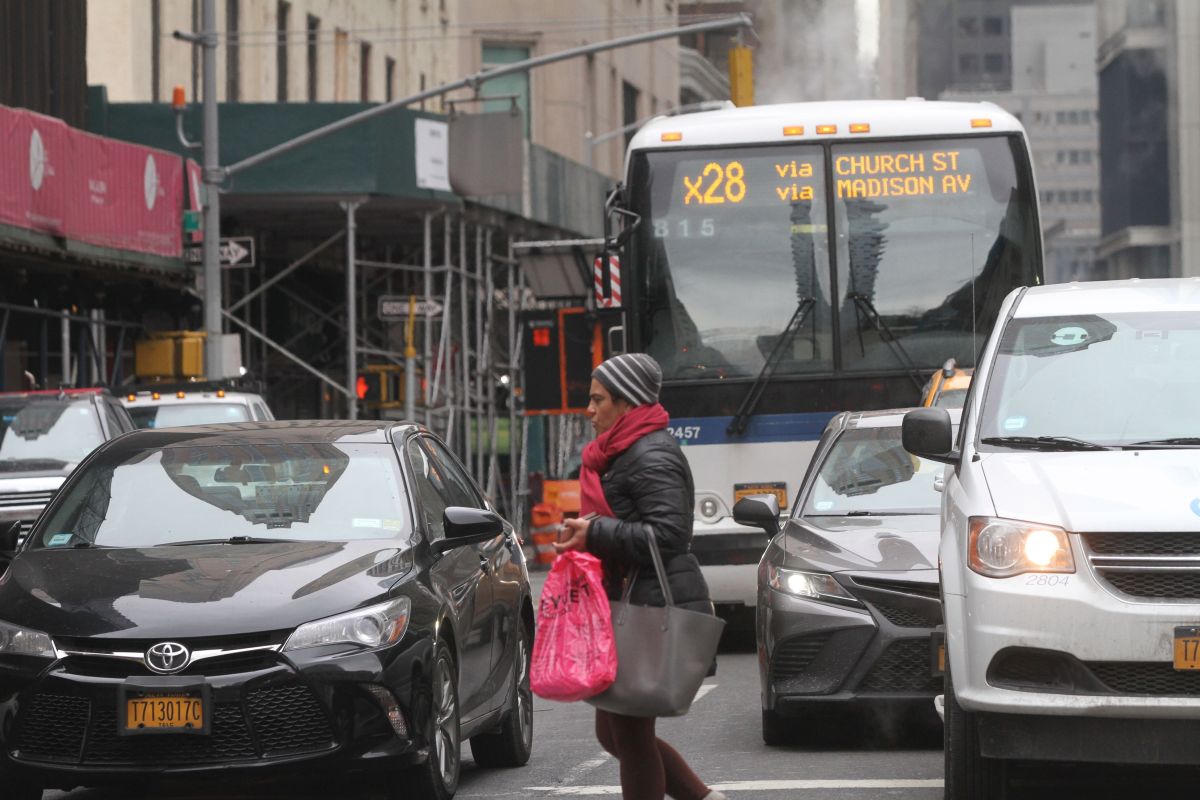Members of the Big Apple coalition of organizations in favor of public transport users #FixTheSubway demonstrated Thursday at the entrance of the George Washington Bridge to push for the congestion charge that, according to them, will reduce traffic congestion, improve the availability of trains and buses as well as improving air quality by reducing the city’s carbon footprint.
The congestion charge, which won authorization in the state legislature in 2019, would raise about $15 billion to, among other things, fund new subway signals, train cars and elevators at stations.
Danny Pearlstein, director of policy and communications for the Riders Alliance – one of the coalition organizations – assured that the congestion charge “will offer great traffic improvements, speed up buses, emergency vehicles and deliveries, and improve quality of the air of the region”.
The activist reiterated that the opponents of this initiative have had time to offer other alternatives, but they have only limited themselves to making destructive criticism.
“With Governor Hochul and Mayor Adams on board, we need the federal government to give New York the green light passengers deserve,” Pearlstein said.
Coalition leaders and public officials have emphasized the important role the plan can play in alleviating the economic fallout from the COVID-19 pandemic.
“New York City’s post-pandemic recovery exposed the socioeconomic inequities of our beleaguered subway system and traffic-filled streets,” said New York City Comptroller Brad Lander, who argued that the subway system Metro is a lifeline for the city’s economy that cannot be sustained without a sustainable stream of funding for major repairs and signal upgrades.
Lander, who participated in yesterday’s rally, was forceful in calling for the implementation of the congestion pricing plan that will increase revenue for much-needed public transportation initiatives and shorten travel times for bus drivers and passengers. “He can not wait”.
For her part, Lisa Daglian, executive director of the MTA Permanent Citizens Advisory Committee (PCAC), called on politicians in neighboring New Jersey to invest in improving “their own state’s public transportation.”
Daglian’s outcry would be directed at New Jersey Congressman Josh Gottheimer, who is a fierce opponent of congestion pricing, to the point that last January he introduced the Anti-Congestion Tax Act, which if approved would block funds for MTA capital projects and would give drivers a federal tax credit if they pay the fee.
“In addition to improving transit for all New Yorkers, millions of commuters and visitors to New Jersey will benefit from congestion pricing,” Daglian said. “Instead of further delaying a New York State law that would undoubtedly improve our city and region, New Jersey politicians should invest in improving their own state’s public transportation, which is already the mode of choice for most of travelers from that state move to the densest city in the nation.”
Positive impact on the environment
Other activists, such as Shawn Garcia, Bronx/Uptown organizer at Transportation Alternatives; Natasha Elder, NYPIRG Regional Director of Equity and Resiliency Projects and Mary Barber, State Director of Affairs for the Environmental Defense Fund appreciated the positive impact the initiative would have on the environment.
“The future of New York City cannot be built around cars. The congestion charge is a once-in-a-generation opportunity to invest in public transportation, reduce pollution by taking cars off the road, and make our streets safer for all,” Garcia said, while Barber pondered that the charge “will benefit everyone who lives in and around New York City – will fund a more modern, reliable, and sustainable public transportation system and reduce overall emissions.”
For his part, Elder argued that the benefits of congestion pricing were many. “It will help New York City continue to fully reopen, reduce congestion on our busiest streets, and reduce the city’s carbon footprint,” he said.
The MTA is waiting for final approval by federal officials for the congestion charge, and although it has not set prices for this ‘toll’ it is considering charging from $9 to $23 for those entering Manhattan on South 60th Street.
Participating organizations included Riders Alliance, Transportation Alternatives, Bike New York, Environmental Defense Fund, Families for Safe Streets, NYPIRG Straphangers Campaign, New York League of Conservation Voters, Open Plans, MTA Permanent Citizens Advisory Committee (PCAC) , Regional Plan Association, Reinvent Albany, Rise and Resist/Elevator Action Group, StreetsPAC, and the Tri-State Transportation Campaign.
